The Year of Reading Proust discussion

This topic is about
The Captive / The Fugitive
The Captive, vol. 5
>
Through Sunday, 13 Oct.: The Captive
 Kalliope wrote: Marcelita wrote: "The hand stenciling is done with real silver metallic pigments aged to a mellow, burnished color. Fortuny built his stenciled pieces layer upon layer, until he achieved the effect of antique brocade..."
Kalliope wrote: Marcelita wrote: "The hand stenciling is done with real silver metallic pigments aged to a mellow, burnished color. Fortuny built his stenciled pieces layer upon layer, until he achieved the effect of antique brocade..."This is exactly the kind of description that Proust was requesting from Maria Hahn de Madrazo to get from Fortuny. The descriptive details. With those Proust would be able to create his beauty in the text. It is as if the painter were requesting the tubes of paint with which then execute his art work. And Proust's evocation creates the beauty that we are all enjoying and appreciating here.. keeping our eyes close to what we have in front of us rather than ranting off.
Keeping our eyes close to the text, Kaliope? Yes, that is principally what these weekly discussions are about for me as a first time reader. And it is the first time readers who have for the most part kept these weekly discussions alive by analysing and debating in detail the elements of each section.
I wonder if these weekly threads could have survived if we each took the approach that their main function was simply as a public notice board for our own personal notes on our reading. I don't publish my personal notes here - they are scribbled all over the margins of my books. What I post here are points I seek to debate with others. This is a discussion forum, after all. And I am grateful that it is an inclusive one, in the sense of diversity, with everyone's points having equal opportunity to be posted and discussed.
How awful if our posts were expected to pass some obscure test of scholarship in order to earn their right to be included? How then would we have had the courage to read on unaided to the tenth month and the sixth book of this colossal challenge?
Yes, this morning I finished the fifth book around nine o clock, and a little while later I looked at the comments posted in the previous hours. The Narrators bouleversement on discovering that Albertine had finally left him parallels the blow I felt on reading Eugene's and Unregisterd's comments in posts #85 and #86. I am heartsore.
 @Fionnuala
@FionnualaMight I remind you of what Proust wrote in Volume 3 that to see yourself as well bred is a sign of ill breeding.
 Kalliope wrote: "Marcelita,
Kalliope wrote: "Marcelita, Thank you for the Saturday fashion pages and for keeping us close to the text.
I have several comments on these.
I agree with you that the cérise or cherry pink that Proust writes is..."
These posts are simply priceless! They have added so much to our reading giving them the rich texture of a tapestry. As a Tiepolo pinker, I was delighted to learn about the painter and his choice of colors and how they relate to Proust, as I am about the Fortuny gown, the name and how it relates to Proust as this has made for thrilling reading. To read Proust and not learn every cultural reference is to lose out on a reading. For this first reading of ISOLT, my interest is primarily focused on understanding the cultural references of which these posts have been most fascinating for me.
Like Fionnuala, I too feel the pain of disillusionment that some have for this type of reading.
 Eugene wrote: "@Fionnuala
Eugene wrote: "@FionnualaMight I remind you of what Proust wrote in Volume 3 that to see yourself as well bred is a sign of ill breeding."
Eugene, I have no idea what you mean by that odd, and it seems to me, irrelevant comment.
 Marcelita wrote: ""...the oriental birds that symbolize alternatively life and death were repeated in the shimmering fabric, of an intense blue which, as my eyes drew nearer, turned into a malleable gold..." MP."
Marcelita wrote: ""...the oriental birds that symbolize alternatively life and death were repeated in the shimmering fabric, of an intense blue which, as my eyes drew nearer, turned into a malleable gold..." MP."Marcelita, all of your images of Fortuny capes and gowns illustrated this week's reading in a particularly apt way. Thanks for sharing your knowledge of this aspect of Proust with us all.
 Eugene wrote: "@Fionnuala
Eugene wrote: "@FionnualaMight I remind you of what Proust wrote in Volume 3 that to see yourself as well bred is a sign of ill breeding."
Ditto the need to point it out.
 Fionnuala wrote: Eugene, I have no idea what you mean...
Fionnuala wrote: Eugene, I have no idea what you mean...Maybe we should ask Scribble as she seems to know ;-)
 Fionnuala wrote: "Marcelita, all of your images of Fortuny capes and gowns illustrated this week's reading in a particularly apt way...."
Fionnuala wrote: "Marcelita, all of your images of Fortuny capes and gowns illustrated this week's reading in a particularly apt way...."Yes, all of Proust's insistence on Fortuny's dresses and their power of evocation of Venice, seem to have a double role in time and in the Narrator's quest.
On the one hand they are pointing at the escape route for the captivity in which the Narrator has locked himself up with Albertine... at the same time, since his fascination with Venice stems from his childhood and Swann's gifts of the Giotto and Titian engravings, they link his present with his time in Combray.
The hinge between Temps perdu et Temps retrouvé.
Si je n'avais jamais vu Vénise j'en rêvais sans cesse depuis ces vacances de Pâques qu'encore enfant j'avais dû y passer, et plus anciennement encore par les gravures de Titien et les photographies de Giotto que Swann m'avait jadis donné à Combray. p. 505.
Here is Giotto's Foolishness.
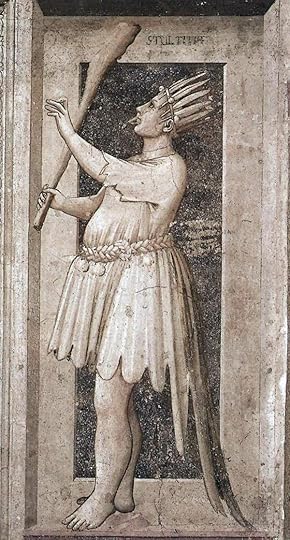
 Kalliope wrote: ".The hinge between Temps perdu et Temps retrouvé.."
Kalliope wrote: ".The hinge between Temps perdu et Temps retrouvé.."Yes, that is very well put, Kalliope and it fits with the Narrator's description of Venice as almost a place outside time, cut of by the blue sea une civilisation urbaine et raffinée, mais qui, isolée par leur ceinture azurée, s'était développée à part.
 Fionnuala wrote: "Kthe Narrator's description of Venice as almost a place outside time, cut of by the blue sea une civilisation urbaine et raffinée, mais qui, isolée par leur ceinture azurée, s'était développée à part. ..."
Fionnuala wrote: "Kthe Narrator's description of Venice as almost a place outside time, cut of by the blue sea une civilisation urbaine et raffinée, mais qui, isolée par leur ceinture azurée, s'était développée à part. ..."Perfect quote.
Given how beautiful and exotic Fortuny's designs are and how avid for adventure, if only a mental kind of adventure, Proust was, it is not surprising that he chose to give so much attention to them.
And through Proust, we also become fascinated by these gowns, as we are by his text, since they come to us through his words... And this is what we are tracking.
 I am eager now to start the next volume and accompany the Narrator to Venice. The Fortuny gowns and your insight of this next book as a 'hinge' between Temps perdu and Temps retrouvé have prepared the way perfectly.
I am eager now to start the next volume and accompany the Narrator to Venice. The Fortuny gowns and your insight of this next book as a 'hinge' between Temps perdu and Temps retrouvé have prepared the way perfectly.
 Fionnuala wrote: "I am eager now to start the next volume and accompany the Narrator to Venice. The Fortuny gowns and your insight of this next book as a 'hinge' between Temps perdu and Temps retrouvé have prepared..."
Fionnuala wrote: "I am eager now to start the next volume and accompany the Narrator to Venice. The Fortuny gowns and your insight of this next book as a 'hinge' between Temps perdu and Temps retrouvé have prepared..."Yes, I am so determined to accompany the Narrator to Venice that I plan carry his book under my arm on my way there next month.. Alas.. I will not be wearing a Fortuny gown...
 "Tiepolo pink"
"Tiepolo pink"Many if not most of these references in Proust to paintings, composers, music, fashion, etc. specifically the color of the sleeves of this particular Fortuny gowns that Albertine wears appear in similes.
"A simile is a figure of speech that directly compares two things through some connective word, usually being "like", "as", "than", or a verb such as "resembles"." From Wikipedia
Here the Narrator's desire to visit Venice is compared, i.e how the gown incites his desire and that has been well stated in these comments. But sometimes it isn't well stated and only the reference, one part of the comparison, is spoken about slighting what the author has to say in totality. But so be it, you have eyes.
If these, sometime lopsided, references/comparisons in similes interest me, I go with them; if they don't...but this is about Proust and we can always go back and investigate, fill out our understanding of the comparison and be a 'Tiepolo Pinkerton'.
.
 When the Narrator hugs and kisses Albertine closely..
When the Narrator hugs and kisses Albertine closely.....serrant contre mon coeur l'azur miroitant et doré du Grand Canal et les oiseaux accouplés, symboles de mort et de résurrection...
He is embracing both his past and future... his dependency and his freedom...
 When I had encountered Breughel's painting of the two monkeys I was not too far off.. but it is the image of the two birds, as seen in the illustration oft Byzantine mosaic that Proust had seen and in their usage in the Fortuny that Marcelita posted, that we have Proust's image.
When I had encountered Breughel's painting of the two monkeys I was not too far off.. but it is the image of the two birds, as seen in the illustration oft Byzantine mosaic that Proust had seen and in their usage in the Fortuny that Marcelita posted, that we have Proust's image.The Narrator describes himself as a captive bird:
Comme un oiseau qui va d'une extrémité de sa cage à l'autre, sans arrêter je passais de l'inquiétude qu'Albertine pût partir à un calme rélatif. p. 512.
So, the two birds, so ubiquitous in this weeks section, are the Narrator and Albertine. Death and Resurrection.
The birds are staring at us and singing to us... plaintive or wailing...
And the doves cooing bring back to the Narrator memories of Vinteuil's Septuor and how the motif of four notes are repeated and give the basic structure to the three movements of the piece....
And so do the couple of birds, and the pervasive tonalities of "rose" and "bleu", create the turning pivot.
.. nous entendîmes la cadence regulière d'un appel plaintif. C'étaient les pigeons qui commençaient à rocouler... La ressemblance entre leur roucoulement et le chant du coq était aussi profonde et obscure que, dans le septuor de Vinteuil.......la ressemblance entre le thème de l'adagio qui est bâti sur le thème-clef que le premieret le dernier morceau, mais tellement transformé par les différences de tonalité.... en ce joyeaux appel qu'avaient poussé tant de fois l'allegro de l'introduction et le finale. pp. 511-512...
And this cooing has the announcement of death.. for the text continues:
Je sais que je prononçai alors le mot mort, comme si Albertine allait mourir.
To repeat the image from the mosaic, the leitmotiv.
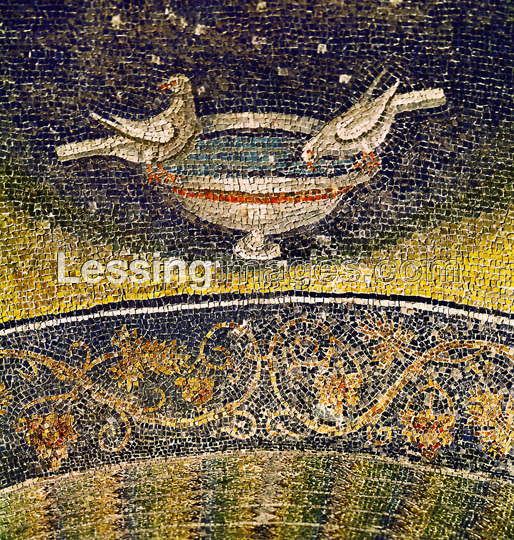
 Kalliope wrote: "When the Narrator hugs and kisses Albertine closely..
Kalliope wrote: "When the Narrator hugs and kisses Albertine closely.....serrant contre mon coeur l'azur miroitant et doré du Grand Canal et les oiseaux accouplés, symboles de mort et de résurrection...
He is embracing both his past and his future....his dependency and his freedom..."
Yes, yes, by embracing Albertine, wrapped in her sumptuous Fortuny dress decorated with these symbolic birds, and that we can now imagine for ourselves so vividly, the Narrator is embracing both death and resurrection. That's a perfect metaphor to lead us towards the last volumes, Kalliope. Thank you.
 On colours..
On colours..I think it was in the first volume that there was a long discussion in the weekly threads on the colours mentioned by Proust and pink or "rose" ranking as number one.
But blue is the other favourite tint. For pink he always uses the word "rose", sometimes but very few times really, qualifying it with an additional workd such as "cherry" or "cérise" as we have seen this week. While for blue he uses many more terms. I think I made a list in an early thread.
In the section on the plane, however, he repeats "bleu" at least six times, without looking for another word.
And in the same way in which we, the readers of Proust (not the same as the readers of the profundities found in secondary texts on Proust), pay attention to his use of colour vocabulary, so did Proust himself when he was a reader of other writers.
When he goes on to describe the moonlight or "clair de lune" (the "clair de lune" was another recurring theme in the Swann-Odette section), Proust writes:
Je lui récitai des vers et des phrases de prose sur le clair de lune, lui montrant comment l'argenté qu'il était autrefois il était dévenu bleu avec Chateaubriand, avec le Victor Hugo d'"Eviradnus" et de la "Fête chez Thérèse" pour redevenir jaune et métallique avec Baudelaire et Leconte de Lisle. Puis lui rappelant l'image qui figure le croissant de la lune à la fin de "Booz endormi", je lui parlai de toute la pièce". p. 520.
 Kalliope wrote: "And this cooing has the announcement of death.. for the text continues:
Kalliope wrote: "And this cooing has the announcement of death.. for the text continues:Je sais que je prononçai alors le mot mort, comme si Albertine allait mourir."
I must admit that I imagined him as Othello for a brief moment when I read that line, especially as it had struck me that he had earlier focused a lot on the amount of murder in Dostoyevsky's writing, although he added that he could never do physical harm to anyone himself, but I still wondered if that was some kind of warning or foreshadowing...
 Fionnuala wrote: "Kalliope wrote: "When the Narrator hugs and kisses Albertine closely..
Fionnuala wrote: "Kalliope wrote: "When the Narrator hugs and kisses Albertine closely.....serrant contre mon coeur l'azur miroitant et doré du Grand Canal et les oiseaux accouplés, symboles de mort et de résurrect..."
He is so ripe for a turn around that even the smell of oil, first evokes for him the flowers of Combray (strange idea for us now)..
...elle (l'odeur de pétrole) faisait fleurir maintenant de chaque côté de moi... les bleuets, les coquelicots et les trèfles incarnats, elle m'enivrait comme une odeur de campagne....
but this odour does not evoke rural immobility, but rather it has connotations of change, of speed, of force...
...une odeur devant quoi fuyaient les routes, changeait l'aspect du sol, accouraient les châteaux, pâlissait le ciel, se découplaient les forces...
and it also brings back memories of Balbec, of the elevator..
.. renouvelait le désir que j'avais eu à Blabec de monter dans la cage de cristal et d'acier...
but this echoes awake in him his desire of the unknown and adventure...
and again, he repeats that it is the Fortuny dresses (thank you Marcelita for helping us picture them in our minds and try to conjure up the same power they had for Proust) that change for him what these evocations of the past really mean...
Mais tout à coup le décor changea; ce ne fut plus le souvenir d'anciennes impressions, mais d'un ancien désir, tout récemment éveillé encore par la robe bleue et or de Fortuny....
and continues further on...
voilà ce que je voulais de ce même désir qui jadis, quan j'étais enfant, dands l'ardeur même du départ, aviat brisé en moi la force de partir: me trouver faca à face avec mes imaginations venitiennes , contempler comment cette mer divisée enserrait de ses méandres, comme les replis du fleuve Océan, ...... p. 524.
And concludes:
Oui, il fallait partir, c'était le moment.
And so are we ready to proceed...
 Fionnuala wrote: "Kalliope wrote: "And this cooing has the announcement of death.. for the text continues:
Fionnuala wrote: "Kalliope wrote: "And this cooing has the announcement of death.. for the text continues:Je sais que je prononçai alors le mot mort, comme si Albertine allait mourir."
I must admit that I imagined..."
Yes, that was so shocking.. it comes so sudden... The Othello image is so apt.
 Eugene wrote: "Ah the music that we hear in the different voices that sing this tale. Here the Narrator--his reflective self comments on his younger active self--explains the duplicity required by being in love.
Eugene wrote: "Ah the music that we hear in the different voices that sing this tale. Here the Narrator--his reflective self comments on his younger active self--explains the duplicity required by being in love...."
Feeling highly sentimental reading this, Eugene. I remember when I first saw Aida performed how struck I was by the intimacy of it despite the grandiosity of its setting (pyramids et al). ISOLT is also so intimate and yet epic at the same time.
 There was such a lushness to this last section of the reading and your comments reflect it. I thoroughly enjoyed reading them all. Thank you so much for your devotion and hardwork in helping us readers get a better understanding of the text.
There was such a lushness to this last section of the reading and your comments reflect it. I thoroughly enjoyed reading them all. Thank you so much for your devotion and hardwork in helping us readers get a better understanding of the text.
 Kalliope wrote: "When I had encountered Breughel's painting of the two monkeys I was not too far off.. but it is the image of the two birds, as seen in the illustration oft Byzantine mosaic that Proust had seen and..."
Kalliope wrote: "When I had encountered Breughel's painting of the two monkeys I was not too far off.. but it is the image of the two birds, as seen in the illustration oft Byzantine mosaic that Proust had seen and..."Not only is the novel becoming more textured and meaningful, but all your posts have enriched our understanding of artists around the world. Such fate...that we have you as our guru-guide on a mini-tour of the history of art.
 The Pianola
The PianolaVinteuil and Reynaldo Hahn
"It was not, however, his music alone that Albertine played me; the pianola was to us at times like a scientific magic lantern (historical and geographical)..." MP p 514
"Sometime during the fall, Proust finally purchased an Aeolian automatic piano player, which was adapted to the grand piano he kept in his room."
Marcel Proust: A Life, with a New Preface by the Author
By William C. Carter; p 547
In September, 2012, Proustians from around the world gathered in Cabourg, for the "Journées Musicales Marcel Proust."
Conference details (now only found in the attic)
(http://web.archive.org/web/2012091111...)
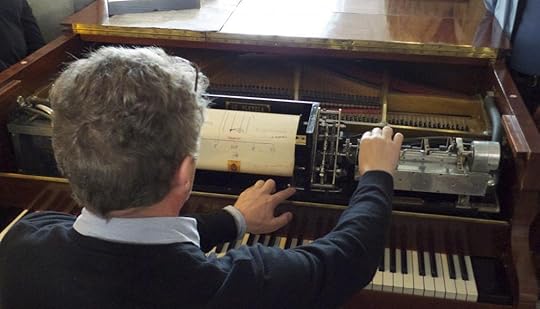
Photo by James Connelly, Grand Hotel in Cabourg, September 2012
At that conference, many of the contributors to the newly published book,
"Marcel Proust - Une vie en musiques avec 2 CD audio"
were there to speak about the musical influences on Proust and the musicians (real and fictionalized) who found their way into À la recherche du temps perdu.
Marcel Proust - Une vie en musiques avec 2 CD audio"
http://www.decitre.fr/livres/marcel-p...
In James Connelly's chapter, "Livret des oeuvres musicales," he writes about Reynaldo Hahn's pianola pieces that are on the CDs (included with the book).
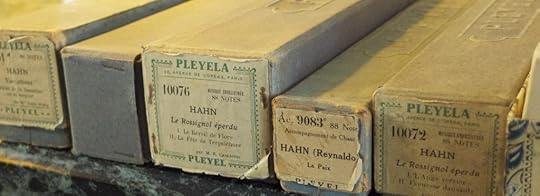
Reynaldo Hahn's pianola rolls
Photo by James Connelly
James Connelly:
"The pianola fascinated Proust, and it features in his novel. 'Ses belles jambes' (“her beautiful legs”) pumping the pianola’s pedals like the bicyclist she was († III,884; § V, 515), Albertine Simonet, the Narrator’s 'Saint Cecilia,' frequently plays the pianola for him († III, 873-75, 883-84; § V, 501-03, 513-15). JC (p 209)
"The pianola links the Narrator’s Paris bedroom with his child’s bedroom in Combray:
'le pianola était par moments pour nous comme une lanterne magique scientifique (historique et géographique), et sur les murs de cette chambre de Paris pourvue d’inventions plus modernes que celle de Combray, je voyais, selon qu’Albertine jouait du Rameau ou du Borodine, s’étendre tantôt une tapisserie du XVIIIe siècle semée d’Amours sur un fond de roses, tantôt la steppe orientale où les sonorités s’étouffent dans l’illimité des distances et le feutrage de la neige'
('the pianola was to us at times like a scientific magic lantern [historical and geographical], and on the walls of this room in Paris, supplied with inventions more modern than my room at Combray, I would see extending before me, according to whether Albertine played me Rameau or Borodin, now an eighteenth-century tapestry sprinkled with cupids and roses, now the Eastern steppe in which sounds are muffled by the boundless distances and the soft carpet of snow.') († III, 883-84; § V, 514).
"In an exquisite touch of verisimilitude, the Narrator mentions in passing that Albertine’s pianola recitals included piano rolls of works by Vinteuil himself." James Connelly (p 209)
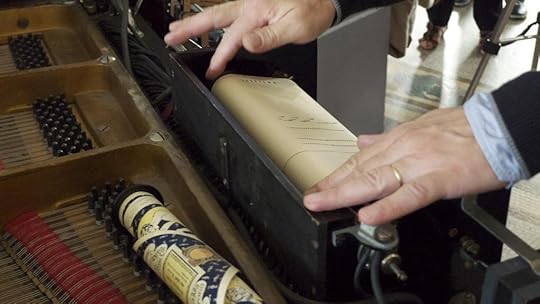
Photo by James Connelly, Grand Hotel in Cabourg, September 2012
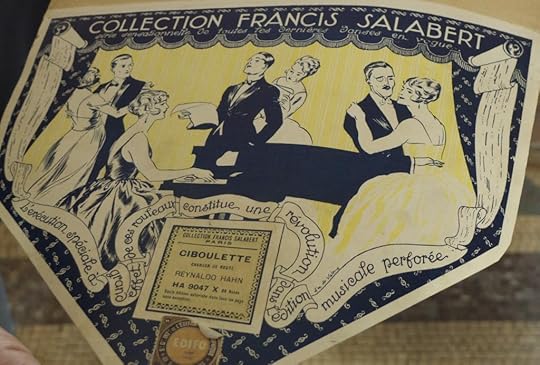
The Pleyel pianola roll of Hahn's operetta, "Ciboulette," with the yellow label.
"Proust owned an Aeolian Company pianola, made in Paris. His friend Alfred Agostinelli used to play the pianola for him, as Albertine does for the Narrator. Proust prized it as a way to familiarize himself with certain pieces of music, much as his Narrator does († III, 873-74; § V, 501-02).
Proust’s letters of December 1906 and 5 January 1914 (Corr. 6:170; 13:4) discuss the instrument." James Connelly (p 209)
Marcel Proust - Une vie en musiques avec 2 CD audio"
http://www.decitre.fr/livres/marcel-p...
 Marcelita wrote: "The Pianola
Marcelita wrote: "The Pianola"It was not, however, his (Vinteuil's) music alone that Albertine played me; the pianola was to us at times like a scientific magic lantern (historical and geographical)..." MP p 514
..."
These are lovely, Marcelita..
The pianola also has brings memories of my own childhood. My grandmother's piano was also a pianola and I remember watching, fascinated, how the rolls turned around and the keys played on their own. This was often at Christmas time.
 Ah, Marcelita, that explains a line I didn't fully understand. Albertine says, Voilà un rouleau que nous allons donner à Françoise pour qu'elle nous le fasse changer contre un autre.
Ah, Marcelita, that explains a line I didn't fully understand. Albertine says, Voilà un rouleau que nous allons donner à Françoise pour qu'elle nous le fasse changer contre un autre.So these 'rouleaux' were a kind of cartridge, is that it? So was AAlbertine actually playing with her hands or just pumping the pedals?
 Fionnuala wrote: "Ah, Marcelita, that explains a line I didn't fully understand. Albertine says, Voilà un rouleau que nous allons donner à Françoise pour qu'elle nous le fasse changer contre un autre.
Fionnuala wrote: "Ah, Marcelita, that explains a line I didn't fully understand. Albertine says, Voilà un rouleau que nous allons donner à Françoise pour qu'elle nous le fasse changer contre un autre.So these 'roul..."
The pianola is a kind of computerized piano.. the roll has little holes (like the old cards for computers) that activate a mechanism that presses the keys... so pumping the pedals makes the "rouleaux" roll...
So, someone has to pedal it and the as the little holes are "read my the mechanism" it activates the keys... you also see the keys being pressed down as if by a ghost...
One would buy the "rouleaux" as one would buy recordings.
 @Fionnuala - The cryptic reminder was clearly referring to the expressions of over-bred condescention of post #80:
@Fionnuala - The cryptic reminder was clearly referring to the expressions of over-bred condescention of post #80:... it also seems you may not understand what you read. Neither in this forum nor in Proust. ... may be you have not noticed that it is Proust himself who wrote ... you probably would not be able to appreciate the books of ... may be on a next read you may get more.
I think, however, #80 is more likely a rather unsuccessful parody of one of the ISOLT characters.
@Marcelita - Just because Proust mentions a fabric of someone's clothes does not elevate sartorial description to the level of great literature. My point was that this overwhelming emphasis of discussion on appearances to the neglect of substance is a seemingly unrectifiable loss to the value of this group.
For thousands of years drama had almost no sets or props. The material junk is irrelevant altogether to the significance of literature, which is not to say authors do not use items to anchor a work in historic time. For example, take Goya's famous execution painting with which we must all be familiar. Does it really matter whether the central figure is wearing a yellow shirt or a blue one; cotton or polyester? Does it really matter even what the particular politics of the event were? The greatness of the image entirely rests on the emotional power it evokes in the viewer who instantly perceives the inter-relationships between the characters.
 Thanks for that info, Kall.
Thanks for that info, Kall. Great to see those rolls of Renaldo Hahn's music too, knowing that Proust would have owned and handled such rolls.
So this means too that earlier in this book, when the Narrator sat and played Vinteuil himself, he was using one of these rolls. I did wonder about that as he'd never mentioned having to do piano practice as a child....
 Kalliope wrote: "Fionnuala wrote: "Ah, Marcelita, that explains a line I didn't fully understand. Albertine says, Voilà un rouleau que nous allons donner à Françoise pour qu'elle nous le fasse changer contre un aut.
Kalliope wrote: "Fionnuala wrote: "Ah, Marcelita, that explains a line I didn't fully understand. Albertine says, Voilà un rouleau que nous allons donner à Françoise pour qu'elle nous le fasse changer contre un aut.The pianola is a kind of computerized piano.."
For those interested in the details:
Instruction Booklet for the "Pianola" Piano
http://www.pianola.org/pdfs/88n_uk_19...
 Fionnuala wrote: "Thanks for that info, Kall.
Fionnuala wrote: "Thanks for that info, Kall. ..."
Yes may be, but Proust certainly had a piano in his room (Gautier-Vignal) and I understand that it was a grand piano (even if baby size).. Pianolas are more common on upright pianos...
Here is a picture that shows where the roll goes.
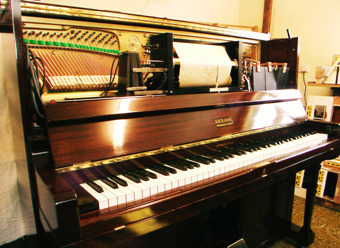
and with a man activating the mechanism.
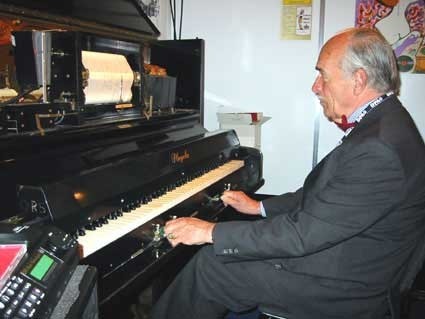
And here is a demonstration....
http://www.youtube.com/watch?v=0nmiRd...
As a child it was fascinating to watch the keys move as if played by a ghost...
And this one shows how the roll is placed...
http://www.youtube.com/watch?v=ydcRAM...
 Since A l'ombre des jeunes filles en fleurs I've dreaded Albertine and the Narrator's atrocious dealing with her in this volume and unfortunately in the next, I suspect, as we will see her again in the Narrator's painful reflections as she left him on her terms not on his terms of self protection. He will suffer on, he will not be bored.
Since A l'ombre des jeunes filles en fleurs I've dreaded Albertine and the Narrator's atrocious dealing with her in this volume and unfortunately in the next, I suspect, as we will see her again in the Narrator's painful reflections as she left him on her terms not on his terms of self protection. He will suffer on, he will not be bored.I felt that my life with Albertine was on the one
hand, when I was not jealous, nothing but boredom, and
on the other hand, when I was jealous, nothing but pain. ML p. 530
That's part of the story part, but of the other hand, the writing part of this volume, its sense of lyric, is rewarding, fresh and un-repetitive; for example, his desire for Venice that was recalled by the Fortuny gown that he bought for her, and too, the lyrical passages that lead up to Françoise telling him, "...and at nine o'clock she went."
However I like this, Proust is such a realist,
One has succeeded in jumping through the calico hoop through which
one thought for a moment that one would never be able
to pass. One has dispersed the storm, returned to a smiling serenity. The agonizing mystery of a hatred with no
known cause, and perhaps no end, is dispelled. Henceforward one finds oneself once more face to face with the
problem, momentarily thrust aside, of a happiness which
one knows to be impossible. ML p. 556
he was so alone.
 I almost lost patience with the narrator's obsessive strategies to keep Albertine captive which bordered on the repulsive. Not that I don't see myself in them to some degree, and at some points in my life, for sure. I wonder if I restrain my full on condemnation of the Narrator because I think of him as the author and therefore in some sense untouchable?
I almost lost patience with the narrator's obsessive strategies to keep Albertine captive which bordered on the repulsive. Not that I don't see myself in them to some degree, and at some points in my life, for sure. I wonder if I restrain my full on condemnation of the Narrator because I think of him as the author and therefore in some sense untouchable?
 Kalliope wrote: "Fionnuala wrote: "Thanks for that info, Kall.
Kalliope wrote: "Fionnuala wrote: "Thanks for that info, Kall. ..."
Yes may be, but Proust certainly had a piano in his room (Gautier-Vignal) and I understand that it was a grand piano (even if baby size).. Pian..."
For you to have experienced the sounds, sans fingers, as a child must have been wondrous...magical!
"Sometime during the fall (1912), Proust finally purchased an Aeolian automatic piano player, which was adapted to the grand piano he kept in his room."
Marcel Proust: A Life, with a New Preface by the Author
By William C. Carter (p 547)
 Unregistered* wrote: "@Fionnuala - The cryptic reminder was clearly referring to the expressions of over-bred condescention of post #80:.."
Unregistered* wrote: "@Fionnuala - The cryptic reminder was clearly referring to the expressions of over-bred condescention of post #80:.."I didn't write post #80 or the words that you quoted.
 Kalliope wrote: "On colours..
Kalliope wrote: "On colours..I think it was in the first volume that there was a long discussion in the weekly threads on the colours mentioned by Proust and pink or "rose" ranking as number one.
But blue is the..."
More about Proust's colors:
The Color-keys to 'A la Recherche Du Temps Perdu'"
By Allan H. Pasco
https://catalyst.library.jhu.edu/cata...
Read article for free, with registration; scroll to the bottom of the page.
http://www.jstor.org/discover/10.2307...
 Kalliope wrote: "When I had encountered Breughel's painting of the two monkeys I was not too far off.. but it is the image of the two birds, as seen in the illustration oft Byzantine mosaic that Proust had seen and..
Kalliope wrote: "When I had encountered Breughel's painting of the two monkeys I was not too far off.. but it is the image of the two birds, as seen in the illustration oft Byzantine mosaic that Proust had seen and.."The Narrator describes himself as a captive bird:"
More birds...
When the narrator was young, after he sees the three steeples of Martinville and writes about his impressions, he sees himself as....a hen!
"Without admitting to myself that what lay hidden behind the steeples of Martinville must be something analogous to a pretty phrase, since it was in the form of words which gave me pleasure that it had appeared to me, I borrowed a pencil and some paper from the doctor, and in spite of the jolting of the carriage, to appease my conscience and to satisfy my enthusiasm, composed the following little fragment, which I have since discovered and now reproduce with only a slight revision here and there.
[...]
"...I had finished writing it, I was so filled with happiness, I felt that it had so entirely relieved my mind of its obsession with the steeples and the mystery which lay behind them, that, as though I myself were a hen and had just laid an egg, I began to sing at the top of my voice." MP Swann's Way
 Marcus wrote: "I almost lost patience with the narrator's obsessive strategies to keep Albertine captive which bordered on the repulsive. Not that I don't see myself in them to some degree, and at some points in ..."
Marcus wrote: "I almost lost patience with the narrator's obsessive strategies to keep Albertine captive which bordered on the repulsive. Not that I don't see myself in them to some degree, and at some points in ..."I agree that there were some parts in this volume in which one could feel there were three and not just two captives. The third being the reader...!!!!..
In my case I felt that more at the beginning of the volume... later on the discussions on aesthetics for me took clearly the forefront.
 Fionnuala wrote: "
Fionnuala wrote: "I didn't write post #80 or the words that you quoted."
I just checked who wrote the comment #80, thinking there could be a bug, but no, it is one of my posts and it has my name.
Only an inattentive reader could think it was you who wrote it.
 Marcelita wrote: "I had finished writing it, I was so filled with happiness, I felt that it had so entirely relieved my mind of its obsession with the steeples and the mystery which lay behind them, that, as though I myself were a hen and had just laid an egg, I began to sing at the top of my voice..."
Marcelita wrote: "I had finished writing it, I was so filled with happiness, I felt that it had so entirely relieved my mind of its obsession with the steeples and the mystery which lay behind them, that, as though I myself were a hen and had just laid an egg, I began to sing at the top of my voice..."I had forgotten about this.... Yes, that was wonderful... When I read it made me laugh...
 Marcelita wrote:
Marcelita wrote:"...I had finished writing it, I was so filled with happiness, I felt that it had so entirely relieved my mind of its obsession with the steeples and the mystery which lay behind them, that, as though I myself were a hen and had just laid an egg, I began to sing at the top of my voice." MP Swann's Way
Great find. We come full circle with the chicken posts.
 "Good-bye, Volume 5." "Good-bye, The Captive."
"Good-bye, Volume 5." "Good-bye, The Captive." Because Marcel was still correcting the proofs--the exact ending for "Albertine Sleeping"--on October 24th, less than a month before his death, closing this book leaves me profoundly sad.
"His final letter to Gallimard said, in deathbed surrender, 'I think now the most urgent action is to deliver all my books to you. The sort of tenacious work that I have done for The Captive...forced me to set aside the following volumes.'"
"Due Considerations: Essays and Criticism" By John Updike
Chapter: William C. Carter's Proust (p 529)
http://books.google.com/books?id=bzcZ...
 Fionnuala: don't be heartsore; I love your comments...Also, I too have thought several times about Othello, and, synchronously enough, in terms of time. However, Proust (as usual) says it best: "other people can never see things from our point of view and therefore do not realize the magnitude of the injury that words uttered at random can do to us."
Fionnuala: don't be heartsore; I love your comments...Also, I too have thought several times about Othello, and, synchronously enough, in terms of time. However, Proust (as usual) says it best: "other people can never see things from our point of view and therefore do not realize the magnitude of the injury that words uttered at random can do to us."p.s. I'm a Libra, too!
 From a Proust bio (don't remember which one): he was very disappointed at first with his player piano; he thought to order Bach, Beethoven, Chopin, etc. The piano company wrote him back with amazement that "no one had ever requested those composers." Poor man; I hope he got them in the end.
From a Proust bio (don't remember which one): he was very disappointed at first with his player piano; he thought to order Bach, Beethoven, Chopin, etc. The piano company wrote him back with amazement that "no one had ever requested those composers." Poor man; I hope he got them in the end.I had the same experience in the early 80s when we first got a VCR; I thought excitedly: Now I can watch all those wonderful films (Bergman, Fellini) I watched in college. Hah. Shlock; nothing but shlock (in those pre-amazon days).
 Elizabeth wrote: "Fionnuala: don't be heartsore; I love your comments...Also, I too have thought several times about Othello, and, synchronously enough, in terms of time. However, Proust (as usual) says it best: .."
Elizabeth wrote: "Fionnuala: don't be heartsore; I love your comments...Also, I too have thought several times about Othello, and, synchronously enough, in terms of time. However, Proust (as usual) says it best: .."Elizabeth, it's good to see you hear in the discussions as well as in the Lounge. I feel you probably know as much about the Recherche as anyone here. Is your rereading up to date?
 Fionnuala: every night I open my volume (reading in bed is my favorite time) and my husband remarks, "Are you doing your homework?" Yes, I finished this week's reading last night and have some questions, and have posted elsewhere: is it too early to ask them? Should I wait?
Fionnuala: every night I open my volume (reading in bed is my favorite time) and my husband remarks, "Are you doing your homework?" Yes, I finished this week's reading last night and have some questions, and have posted elsewhere: is it too early to ask them? Should I wait?
 Elizabeth wrote: "Fionnuala: every night I open my volume (reading in bed is my favorite time) and my husband remarks, "Are you doing your homework?" Yes, I finished this week's reading last night and have some que..."
Elizabeth wrote: "Fionnuala: every night I open my volume (reading in bed is my favorite time) and my husband remarks, "Are you doing your homework?" Yes, I finished this week's reading last night and have some que..."Go for it, Elizabeth. Your questions are bound to make us think!
 OK. One: the Narrator asks Albertine's concierge where she has gone. This implies that she has a separate apartment? However, she has been living fulltime with the Narrator.
OK. One: the Narrator asks Albertine's concierge where she has gone. This implies that she has a separate apartment? However, she has been living fulltime with the Narrator.Two: the Narrator says, "Having one day opened by mistake a letter to one of my mistresses, a letter written in a pre-arrranged code..." Then he goes on to say the letter had been for another person in his building, and delivered to him by mistake.
My point: ONE of my mistresses? Does it perchance really say "one of my mistresses' letters"? I find this passage very confusing. N.b. it is on p. 573 of the Modern Library edition, trans by Moncrieff and Terence Kilmartin, revised by D.J. Enright. It's rather thrown my for a loop. That and the fact that Albertine has a concierge of her own. Any thoughts?
Books mentioned in this topic
Οι γάμοι του Κάδμου και της Αρμονίας (other topics)La Folie Baudelaire (other topics)
Tiepolo and the Pictorial Intelligence (other topics)
The Gothic Image: Religious Art in France of the Thirteenth Century (other topics)
Tiepolo Pink (other topics)


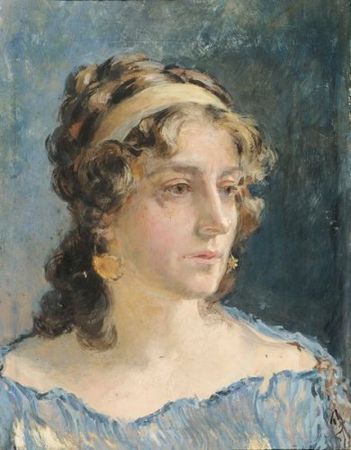


Exactly... and it was later known because Cottard did not keep his promise of maintaining secret the financial aid they had extended to poor Saniette.